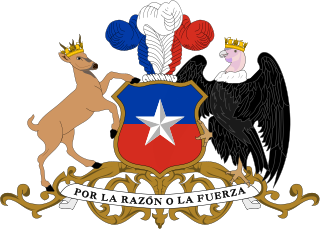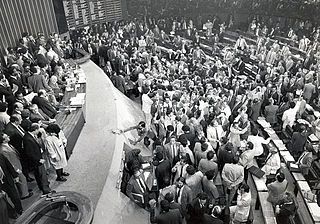
Chile's government is a representative democratic republic, whereby the President of Chile is both head of state and head of government, and of a formal multi-party system. Executive power is exercised by the president and his or her gabinet. Legislative power is vested in both the government and the two chambers of the National Congress. The judiciary is independent of the executive and the legislature of Chile. The Constitution of Chile was approved in a national plebiscite in September 1980, under the military government of Augusto Pinochet. It entered into force in March 1981. After Pinochet left power in 1988, saying this country was ready to keep going along with a plebiscite, the Constitution was amended to ease provisions for future amendments to the Constitution. In September 2005, President Ricardo Lagos signed into law several constitutional amendments passed by Congress. These include eliminating the positions of appointed senators and senators for life, granting the President authority to remove the commanders-in-chief of the armed forces, and reducing the presidential term from six to four years while also disabling immediate re-election. The Economist Intelligence Unit has rated Chile as "flawed democracy" in 2016.

The politics of Ethiopia arise from the way the government of Ethiopia is structured as well as socioeconomic factors. The country's government is structured as a federal parliamentary republic with both a President and Prime Minister.

Fine Gael is a political party in Ireland. Fine Gael is currently the governing and largest party in Ireland in terms of members of the Oireachtas and Irish members of European Parliament. The party has a membership of 35,000, and is the senior partner governing in a minority coalition with several independent politicians, with party leader Leo Varadkar serving as Taoiseach. Varadkar succeeded Enda Kenny as party leader on 2 June 2017 and as Taoiseach on 14 June; Kenny had been leader since 2002, and Taoiseach since 2011.

The politics of Zimbabwe takes place in a framework of a full presidential republic, whereby the President is the head of state and government as organized by the 2013 Constitution. Executive power is exercised by the government. Legislative power is vested in both the government and parliament. The status of Zimbabwean politics has been thrown into question by a 2017 coup.

The Croatian Parliament or the Sabor is the unicameral representative body of the citizens of the Republic of Croatia; it is Croatia's legislature. Under the terms of the Croatian Constitution, the Sabor represents the people and is vested with legislative power. The Sabor is composed of 151 members elected to a four-year term on the basis of direct, universal and equal suffrage by secret ballot. Seats are allocated according to the Croatian Parliament electoral districts: 140 members of the parliament are elected in multi-seat constituencies, 8 from the minorities and 3 from the Croatian diaspora. The Sabor is presided over by a Speaker, who is assisted by at least one deputy speaker.

The Derg, officially the Provisional Military Government of Socialist Ethiopia, was a military junta that ruled Ethiopia from 1974 to 1987. Known fully as the Coordinating Committee of the Armed Forces, Police and Territorial Army, the Derg was a committee of low-ranking officers and enlisted men in the Ethiopian Army, led by Chairman Aman Andom, that overthrew the government of the Ethiopian Empire and Emperor Haile Selassie I during mass protests in September 1974. Soon after it was established, the committee was formally renamed the Provisional Military Administrative Council but continued to be known popularly as "the Derg". The Derg formally abolished the monarchy and embraced communism as an ideology, establishing Ethiopia as a Marxist-Leninist one-party state with itself as the vanguard party in a provisional government. The abolition of feudalism, increased literacy, nationalization, and sweeping land reform including the resettlement and villagization from the Ethiopian Highlands became priorities. Mengistu Haile Mariam became Chairman in 1977, launching the Qey Shibir to eliminate political opponents, with tens of thousands imprisoned and executed without trial.

During its independent political history, Brazil has had seven constitutions. The most recent was ratified on October 5, 1988.

Elections in Benin take place within the framework of a multi-party democracy and a presidential system. Both the President and the National Assembly are directly elected by voters, with elections organised by the Autonomous National Electoral Commission (CENA).

At the federal level, Ethiopia elects a legislature. The Federal Parliamentary Assembly has two chambers: the Council of People's Representatives with not more than 550 members as per the constitution but actually nearly 547 members, elected for five-year terms in single-seat constituencies; and the Council of the Federation with 117 members, one each from the 22 minority nationalities, and one from each professional sector of its remaining nationalities, designated by the regional councils, which may elect them themselves or through popular elections.
Elections in Luxembourg are held to determine the political composition of the representative institutions of the Grand Duchy of Luxembourg. Luxembourg is a liberal representative democracy, with universal suffrage guaranteed under the constitution. Elections are held regularly, and are considered to be fair and free.

The current Constitution of the Syrian Arab Republic was adopted on 26 February 2012, replacing one that had been in force since 13 March 1973. The current constitution delineates the basic function of that state's government. Among other things, it determines Syria's character to be Arab, democratic, and republican. Further, in line with pan-Arab ideology, it describes the country as a region of the wider Arab world and its people as an integral part of the Arab nation.

The Parliament of Ethiopia consists of two chambers:

The current Constitution of Ethiopia, which is the supreme law of the Federal Democratic Republic of Ethiopia, came into force on 21 August 1995. The constitution was drawn up by the Constituent Assembly that was elected in June 1994. It was adopted by the Transitional Government of Ethiopia in December 1994 and came into force following the general election held in May–June 1995.

General elections were held in Ethiopia on 14 June 1987 for seats in its Shengo. This was the first election since Emperor Haile Selassie was deposed in the Ethiopian Revolution as well as the first–and as it turned out, only–election under the 1987 constitution, which replaced the Derg regime with the People's Democratic Republic of Ethiopia (PDRE).

Elections for a Constituent Assembly were held in Ethiopia on 5 June 1994 in order to form a body to draw up a new constitution. They were the first elections after the overthrow of the Mengistu regime at the end of the Ethiopian Civil War in 1991, and the first ever multi-party elections in the country; previous elections had either been non-partisan or one-party. The results saw the Ethiopian People's Revolutionary Democratic Front and its allies win 463 of the 544 seats. Voter turnout was 87.5%.

A constitutional referendum was held in the Central African Republic on 21 November 1986, following a military coup in 1981. The new constitution would make the country a one-party state with the Central African Democratic Rally as the sole legal party, as well as allowing André Kolingba to assume the presidency for six years without an election, and abolishing term limits. It was approved by 92.22% of voters with an 87.6% turnout.

The 177th New York State Legislature, consisting of the New York State Senate and the New York State Assembly, met from January 4, 1967, to May 25, 1968, during the ninth and tenth years of Nelson Rockefeller's governorship, in Albany.
Parliamentary elections were held in Ethiopia on 24 May 2015 to elect officials to the House of Peoples' Representatives. Regional Assembly elections were also held on this date.














